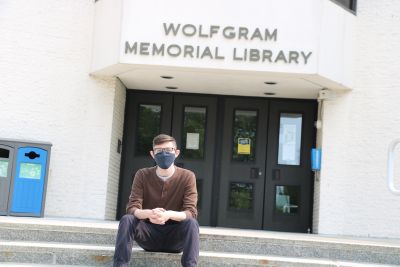Widener Community Financially Assists Struggling Students during Pandemic

Ellysa Grande – like many people – found herself in a predicament last spring.
She was on the cusp of completing her bachelor’s degree and continuing in Widener’s physical therapy doctoral program when the COVID-19 pandemic struck. Her job as an aide in a physical therapy outpatient clinic temporarily vanished, and she stressed over how to pay rent and utilities while continuing her studies.
Luckily for Grande and other students in need, the Widener community is like a family. And it cares to a generous degree.
She applied to the Widener Student Emergency Fund, newly developed by the university during the pandemic to provide immediate assistance to students with pressing, unmet needs. The funding was just what Grande needed to weather her three-month job loss.
I’m very grateful to everyone who donated. It didn’t just help me; it helped a lot of other people, too. — Ellysa Grande
Widener has long been known for its unparalleled support of students, from academic advising and faculty mentorship to career development and counseling services. The coronavirus health emergency has presented unique challenges for students, though.
Many have been dealing with unexpected costs, including travel, technology needs, or the loss of internship, co-op, or job wages. In some cases, their families experienced the loss or reduction of parents’ wages, impacting the ability to pay tuition and expenses.
“We created the Widener Student Emergency Fund to make a difference for our students who are facing real challenges at the same time as they are pursuing their educational goals,” Associate Vice President for Development and Alumni Engagement James Gulick said. “And, as expected, Widener’s community of faculty, staff, alumni, and friends gave generously without hesitation.”
The fund, which supports undergraduate and graduate students on Main Campus, as well as Delaware Law School and Widener Law Commonwealth, has raised more than $100,000 from 123 donors as of Sept. 28, 2020. Widener has distributed funds to 100 students so far.
Alumnus Jason Haitkin, a 2001 graduate and real estate manager in New York, was one such donor. He contributed in hopes that the fund would help students in need manage the stress and turmoil caused by the pandemic.
“When the pandemic first began, I got the email from Widener that classes were moving online and some students were struggling financially,” Haitkin said. “I am self-employed and felt lucky to continue working during this time. I wanted to pass that on to students at Widener.”
For senior accounting major Charles Kelly, the fund provided a lifeline when he needed it most. But that support, he says, is normal at Widener.
“The reason I came to Widener was I always feel at home when I’m on campus or in class,” Kelly said. “The student emergency fund reaffirms the feeling that Widener cares about students and their wellbeing.
Kelly, a first-generation college student who transferred to Widener, has come to rely on three on-campus, work-study jobs to financially afford his private college loans. In March, when the university shifted to online learning in response to COVID-19, his income dropped and his living expenses rose.
“I had built up a little bit of a bank account before I left campus, but suddenly I was paying rent, buying food, paying loans, and making no money,” Kelly said. “Everything piled up over time.”
Kelly turned to Director of Student Success & Retention Tim Cairy and Dean of Students John Downey, who both recommended he apply to the Widener Student Emergency Fund.
“Tim even offered that if I’m really struggling he could drop off food,” Kelly said. “It was really nice to know I had that option if I needed it.”
Kelly’s request to the fund was granted, allowing him to focus on his studies instead of daily living expenses.
“I don’t know what I would have done without the help from Widener,” he said. “I’m not one to ask for help from family and friends, and I don’t want to feel like a burden to anyone. It means a lot that Widener is willing to help those who need it.”
“That helping hand is the reason I’m still here at Widener,” Kelly added.



